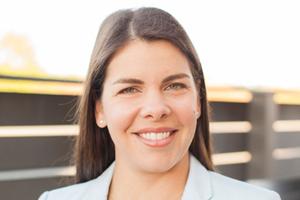Achievements
All That She Can Be: Melissa Mangold is a 2018 Tillman Scholar

Pat Tillman was an extraordinary individual, passing up millions of NFL dollars to serve his country after the September 11 terrorist attacks. He died tragically in a friendly fire incident in Afghanistan, but his spirit lives on through the Pat Tillman Foundation. Every year, the Pat Tillman Foundation offers scholarships to outstanding active-duty service members, veterans, and their spouses. Melissa Mangold, an American University School of International Service graduate student, is among the 2018 Tillman scholars.
Mangold will use $6,000 in scholarship money toward her online master’s degree of international service. She didn’t know much about Tillman’s personal story—other than what she read in news reports—but she’s been inspired by him while applying for the scholarship.
“His life really does set a standard for all of us to try to meet. So I enjoyed applying for this, and I’m so honored to be a recipient. It’s going to help me continue to be the best that I can every day—by following his example,” Mangold says in an interview.
Found in Translation
A New Hampshire native, both of Mangold’s parents served in the military: her mother was a cook in the Army, and her father was a fireman and boiler mechanic in the Navy. During her high school years, Mangold was an exchange student in Japan, and she’d hoped to study the East Asian nation in college. Unfortunately, Mangold’s higher ed plans were derailed.
“My mom got really sick my senior year, and the treatments that we had to give her weren’t covered by insurance. So it ended up pretty much bankrupting our family,” Mangold recalls.
But she still had unfulfilled dreams, and serendipity intervened not long after 9/11. “I was waitressing in Florida, and I just saw my life going nowhere way too fast,” she remembers. “And one night, at one of my tables, I happened to say ‘you’re welcome’ in Japanese. And the customer said, ‘Oh, you speak another language?’”
He turned out to be an Army recruiter, and after some discussions, Mangold was in the Army recruiting office two days later. Soon after she was headed to the Defense Language Institute in Monterey, California with hopes to learn Japanese fluently. To her surprise, the language choice wasn’t really up to her, and she was assigned Korean instead. But in a post-9/11 environment, there was great demand for Arabic speakers, and she learned that language in a year and a half of intense study.
Some of her professors in California were first-generation Middle Eastern immigrants, and it was a critical period for their home region. “I was there when we captured Saddam Hussein. And there was just that tension in the air—people didn’t know how to feel about it. They were happy, but cautiously optimistic,” she says.
Mangold was subsequently stationed in Georgia to do intelligence work, mostly plowing through reports in a windowless room for the remainder of her enlistment. She’d eventually land a position at the State Department, going to school at night to earn her bachelor’s degree at George Mason University.
State Department and Security
Mangold was a civil servant at Foggy Bottom before working at the US embassy in Tunis. She came to appreciate the food, music, and culture of Middle Eastern societies. She remembers how aftershocks from a terrorist attack in southern Tunisia permeated the entire country, affecting people quickly.
“What I really love about the culture is how close-knit everyone truly is,” she says. “After serving there, it makes sense to me why the Arab Spring started in Tunisia.”
Mangold later took interest in diplomatic security. It’s an occupation populated with many ex-military officials, so it seemed like a natural fit for her skill set. She’s now a special agent with the Diplomatic Security Service, the law enforcement arm of the State Department. She’s currently involved in high-threat training, which prepares agents for posts like Kabul or Baghdad.
“This training is wild. We just run around with our vest on with our weapons and get shot at by paintballs,” she says. “It’s really intense. It’s been a lot of fun.”
But she doesn’t just view this work as a series of physical challenges. She wants to understand policy—to get a more complete picture of the countries where she might be stationed—and that’s a major reason why she enrolled at AU.
“I chose American because it has a very good reputation within the State Department,” she says. “Between Foreign Service officers and diplomatic security, sometimes there’s a bit of misunderstanding with roles and responsibilities. So what I viewed my degree from AU being is a bridge over that gap.”
There’s even a familiar State Department face at AU. Her former boss at the agency, Raymond Maxwell, is now a part-time reference librarian at AU. “Almost every opportunity I had was from him. He’s just incredible.”
What’s Next
She’s slated to finish her SIS master’s degree in May 2019, and she says the program exceeded her expectations: “I just felt so supported. I love the course curriculum. I love the content, and the online forum is perfect for me.”
Long term, Mangold would love to go back overseas to work with embassies, but she’s not fixated on a particular position. In one form or another, she’s thinking about the greater good.
“I think the service life was really instilled in me by my parents. My mom was always having us out doing community service, and getting involved with our church,” she says. “So it just never really was a question. I really take a lot of personal pride in this lifestyle.”
